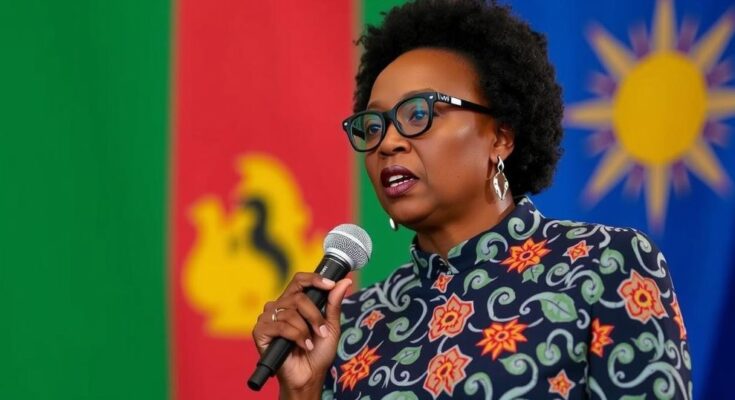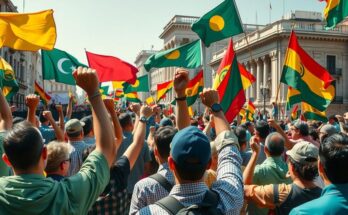Namibia is poised to potentially elect its first female president, Netumbo Nandi-Ndaitwah, who currently leads the race. However, allegations of electoral misconduct could result in a court challenge from opposition parties. Following technical issues and extended voting periods, the legitimacy of these elections is heavily contested, with a significant impact expected on political stability and representation in Namibia.
Namibia is on the verge of electing its first female president, Netumbo Nandi-Ndaitwah, who currently leads the presidential race with 54.82 percent of the vote, based on 65.57 percent of ballots counted. However, if she does not attain more than 50 percent by the time all votes are tallied, a run-off election may be necessary. The election process has been marred by technical issues and delays, prompting significant protests from the opposition regarding the election’s legitimacy.
Nandi-Ndaitwah, who serves as the current vice president and represents the South West Africa People’s Organisation (SWAPO), faces a challenge from the Independent Patriots for Change, whose candidate, Panduleni Itula, secured only 28 percent of the votes thus far. The voting concluded amidst accusations from the opposition, who labelled the electoral process a sham and raised concerns about irregularities. Additionally, the electoral commission extended voting days due to logistical issues, a move criticized by opposition leaders, who argue it undermined transparency.
SWAPO, in power since Namibia’s independence in 1990, has garnered criticism from disenchanted youth due to persistent unemployment and inequality. With more than 73 percent turnout recorded among the nearly 1.5 million registered voters, it remains crucial for Nandi-Ndaitwah to surpass the essential threshold to avoid a second round of voting. Legal challenges to the election results are anticipated as opposition parties unite to contest the perceived injustices that occurred during the electoral process.
The tensions surrounding this election could significantly impact Namibia’s political landscape, prompting increased scrutiny of the existing government. The outcome will not only determine the leadership of the country but will also continue to influence critical issues such as unemployment, economic disparity, and the integrity of electoral processes in the future.
Namibia, having gained its independence from apartheid South Africa in 1990, has generally maintained stability and a reputation for democratic governance. However, recent elections have revealed cracks in this democratic facade, particularly with various reports of electoral irregularities. The country experiences high levels of youth unemployment and societal inequality, which have led to rising discontent among younger voters. The current political environment is shaped by the narrative of governing party SWAPO, which has been in power for over three decades, and its challenges from emerging opposition parties seeking reforms and fair representation in governance.
In conclusion, Namibia’s current electoral scenario suggests a critical juncture in its history, with the possibility of Netumbo Nandi-Ndaitwah becoming the first female president. However, the legitimacy of the electoral process has been severely questioned, with opposition parties ready to pursue legal avenues in response to perceived irregularities and mishandling of the election. The outcome of this election carries substantial implications for the country’s political stability and the engagement of its youth in governance.
Original Source: www.aljazeera.com




